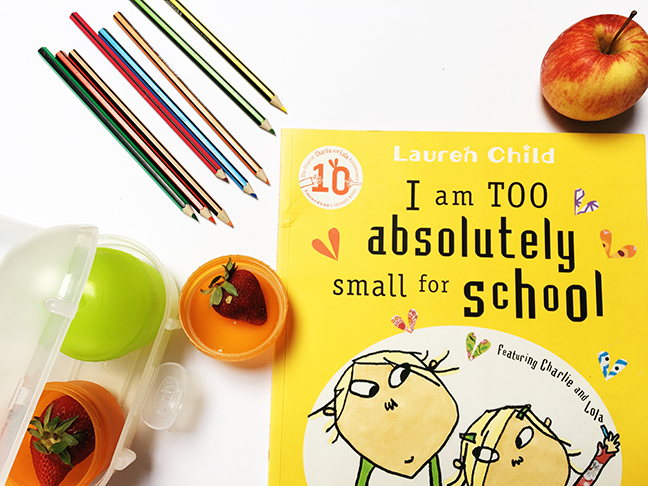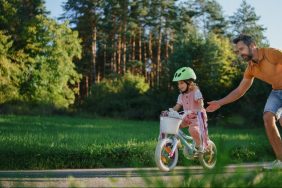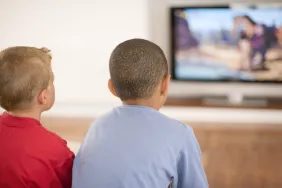Hands up if you have a little person about to start Big School?
It is natural for all family members to be feeling all the feels at this exciting, but also anxious and stressful, time. Starting school involves a big change for all the family. We all have different ways of coping with this range of emotions, of course, but one thing is for sure: family plays an incredibly important role in creating a smooth and fun transition to school life.
As a Kindergarten teacher, I’ve done the “First Day at Big School” a many, many times. Here are 21 ways you can help prepare your child for their first day at school.
1. Help your child personalise his school bag. Most schools have standard issue school bags and this can be a nightmare when everybody hangs their bag up in the same place. Your little person is expected to locate his bag in this massive sea of sameness. Get the School Excitement ramped up by taking your child shopping for a trinket he can dangle on his school bag.
Or help him make something that he can attach to his bag that will distinguish it and help him pick it out straightaway.
2. Familiarise your child with her school bag and how it works. How many zips and compartments does a school bag need?! School bags these days seem to come with a multitude of them. Walk and talk your child through the set-up of her bag. Let her practise zipping and unzipping and, most importantly, discuss what will be packed into each compartment. Remember to allocate an area just for school notes!
3. Let your child practise packing and unpacking his school bag. Getting a lunch box or a home reader folder in and out of a school bag is hard work, people! Get your child to practise packing and unpacking his bag. Make it a game of hypotheticals: It’s a super hot day and you take your jumper off. Where will it go? Your teacher gives you a super important note to bring home. Where will you put it?
4. Practise wearing school shoes. Because nobody needs blisters impeding their fun in the first few weeks of Big School.
In fact, it’s a great idea to get your child to practise wearing all of the elements of her uniform.
5. LABEL ALL OF THE THINGS. Schools are like a Black Hole of Lost Property. If I had a dollar for every time a parent or carer came into my classroom looking for a lost hat/ jumper/ lunch box/ child… Label everything!
6. Discuss with your child how he is responsible for his belongings. Following on from point #5, it’s also a good idea to chat with your child about how he is responsible for his belongings. Your child’s classroom will most probably have routines in place for what to do with lunch boxes, library bags, etc.In my Kindy classroom, I had a rule that no sentence could begin with “Mum forgot to pack..” Start discussing with your child how he will be in charge of his things at school.
7. Familiarise your child with her lunch box. Like the school bag, lunch boxes can be a complicated affair. Make sure your child has practise with opening the different compartments. Packets and containers can also be tricky for little hands to open.
So let your child repeatedly and independently try opening any packets that you intend on sending in her lunchbox.
8. Practise eating at recess and lunch time. Help your child’s body clock adjust to eating at specific times and practise eating at school recess and lunch time. Better yet, have him eat out of his lunch box at these times, so he can practise using all the compartments. Discuss what to eat when as there is nothing more heartbreaking than having a little learner approach you at lunchtime to tell you he ate ALL his food at recess.
9. Read picture books about starting school. Picture books provide a wonderful way for children to process and discuss their feelings about starting school. Here’s a list of great picture books about starting school.
10. Role play social situations that may occur on the playground. The playground is a vast space. Sometimes it can be tricky to join games or find people you know to play with. Role play is a great way for your kids to practise the sorts of situations they may encounter in the playground. It also helps to equip them with the language and vocabulary needed to connect with other children.
READ MORE: 18 ways to help your child navigate the social playground
11. Discuss bathroom etiquette. At Big School, children are expected to use the bathrooms independently. Chat with your child about how he will need to use a cubicle by himself, lock the cubicle door and clean himself.
12. Play board games. Board games are a great way to practise the skills of waiting and taking turns to participate- vital skills for in the classroom. Use the game situations as an opportunity to discuss how in the classroom you also need to take turns when speaking.
13. Develop a positive goodbye routine If you suspect that separating from you could be an issue once the school day starts, start thinking of ways to establish a positive goodbye routine. Could you have a secret handshake or sign? Could your child take a special trinket that helps remind them that you’ll see them again soon? You don’t want to psych your child out too far in advance by talking and talking about it, but it’s good to have a plan in motion if you suspect that this could be a stressful part of the process.
14. Focus on following instructions. So much of school involves being an active listener and following instructions. Help your child prepare for this by playing impromptu games that involve following sets of instructions. “Walk slowly over to the kitchen, touch the fridge door and then touch your toes.”
15. Practise sentence starters to express feelings and needs. School can be fast-paced and children often need to deal with a variety of teachers. For example, a typical Tuesday morning in my Kindy classroom involved 5 transitions in and out of the room. By 11am, my students have dealt with me, their scripture teacher and the music teacher. Students will find it useful being able to communicate their needs to a range of people. You can help this process by modeling the kinds of sentence starters that might be appropriate in different situations.
16. Practise timed activities at tables. School is different to preschool in that activities are often more structured and timed.
Children may be expected to remain at an activity until the teacher asks them to move onto another activity. They are then expected to move on once instructed to do so. You can practise this by setting up some activities at home in different places, e.g., a cutting activity, a play dough activity, a puzzle activity. Inform your child that she will get a certain amount of time at each station before being instructed to move on (there’s those pesky instructions again!)
17. Work out a morning routine. To minimise stressful school mornings, work out how your mornings will flow. You might find it useful to have a few practise runs in the weeks before school starts. You could take photographs as you and your child role play the routine. These photos could then be used to create a visual timetable that can be referred to.
THIS MIGHT HELP: 10 Things to Do at Night to Make the Mornings Hurt Less
18. Establish a good bedtime routine in the weeks preceding school starting. School is exhausting! For the first term, I can pretty much guarantee that at least one student will fall asleep in the afternoon session.A good night’s sleep is imperative to getting through a school day.
19. Organise play dates in the holidays before school starts. It always helps to know familiar faces in unfamiliar places.
Try and organise some play dates with other families starting at your child’s school.
20. Factor in downtime for the first few weeks of term. Don’t overload your child’s after-school schedule in the first few weeks of term. Allow her time to play and decompress. It is also helpful to ask children about their school day a few hours after school ends, rather than at the school gate as they need the head space to process the school day. You might like to think of specific questions you can ask about their day: What was the most fun part of your day? What did you enjoy learning about today? If you simply ask, “How was your day?” The response from your child will be “Good.”
21. Locate your biggest pair of sunglasses. You may need them if you get something in your eye as you wave goodbye to your little learner on the first day. Channel your inner Jackie O and hide behind some sunnies.
Good luck to all the families starting at Big School this year!
Image: Shannon Wong-Nizic








